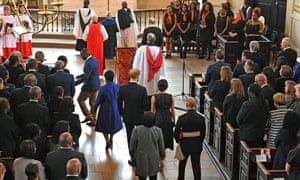Theresa May has announced an annual Stephen Lawrence Day to be held each year on the anniversary of the teenager’s murder.
The prime minister made the announcement at a memorial service to mark the 25th anniversary of the hate crime that shocked the nation and led to the Metropolitan police being labelled as institutionally racist.
In a statement, Stephen’s mother, Doreen Lawrence, welcomed the announcement. “I feel honoured she has recognised the changes that have been made in Stephen’s name and the changes that are still needed.”
Stephen Lawrence Day would be “an opportunity for young people to use their voices and should be embedded in our education and wider system regardless of the government of the day,” she added. The first Stephen Lawrence Day will be on 22 April 2019.
Prince Harry and Meghan Markle were among the up to 800 people who attended the service.
The service on Monday, at St Martin-in-the-Fields in Trafalgar Square in central London, was also attended by Theresa May, Jeremy Corbyn, the London mayor Sadiq Khan, actor Lenny Henry, singer Beverley Knight, and the Metropolitan police commissioner Cressida Dick.
Stephen’s mother, Doreen Lawrence, and his brother Stuart greeted guests at the church entrance before the service, which was held to celebrate his life and legacy. Many of those attending the service were wearing the orange ribbon lapel badges of the Stephen Lawrence Charitable Trust.
Harry and Meghan were the last of the VIP guests to arrive, stopping to talk for a few moments to Doreen and Stuart. Crowds who had gathered outside the church cheered as the couple, who are to marry in less than a month, arrived.

During the service, Harry read a letter of support on behalf of his father, the Prince of Wales. It said: “I remember vividly the profound shock that I felt at [Stephen’s] senseless murder, a feeling shared by so many people across this country and beyond. I remember, too, just how deeply moved I was by the determination of his family to build something positive from the tragedy they endured and to ensure that Stephen’s story did not end with despair, but continued with hope.”
Letters of support were also sent by May, Corbyn, home secretary Amber Rudd, and former home secretary Jack Straw.
Corbyn read an extract from Nelson Mandela’s autobiography, A Long Walk to Freedom. The late anti-apartheid hero and former president of South Africa met the Lawrence family at his request while on a visit to London two weeks after Stephen’s murder. The meeting helped to focus national attention on the hate crime.
As well as hymns, readings, prayers and reflections, Beverley Knight sang two songs, A Change is Gonna Come and Fallen Soldier. Lenny Henry interviewed three beneficiaries of the Stephen Lawrence Charitable Trust, which last year supported more than 2,000 young adults with training, mentoring and bursaries.
The service opened and closed with music from a gospel choir.
In an introduction to the order of service, Doreen Lawrence wrote: “I wish for Stephen’s name not to be identified by his murder, but by the mark he has left on this country and the wider world and for the role model he was and continues to be for many young people today, even though the majority of them would not have been born at the time of his death.”
She added: “It has been a long journey that is not over yet, for there are many injustices that are still taking place today.”
Stephen was murdered by a gang of five youths in Eltham, south-east London, on 22 April 1993. Only two, David Norris and Gary Dobson, were convicted of murder almost two decades later, and last week Scotland Yard said it had no new lines of inquiry to pursue.
The failure of police to investigate Stephen’s murder properly and bring to account those responsible, and their shocking treatment of his family and friend Duwayne Brooks, led to a watershed moment in race relations in the UK. The subsequent Macpherson inquiry concluded the police were guilty of institutional racism.